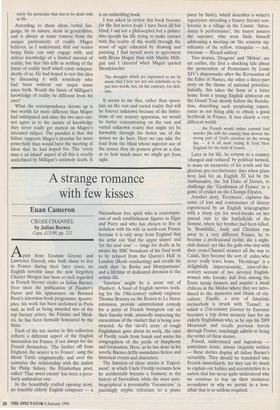A strange romance with few kisses
Euan Cameron
CROSS CHANNEL by Julian Barnes Cape, £13.99, pp. 211 Apart from Graham Greene and Lawrence Durrell, who both chose to live in France during their later years, no English novelist since the now forgotten Charles Morgan has been so well regarded in French literary circles as Julian Barnes. Ever since the publication of Flaubert's Parrot and his appearance on Bernard Pivot's television book programme Apostro- phes, his work has been acclaimed in Paris and, as well as being awarded two of the top literary prizes, the Fernina and Medi- cis, he has been formally honoured by the State.
Each of the ten stories in this collection reflects a different aspect of the English fascination for France, if not always for the French themselves. 'The further off from England, the nearer is to France', sang the Mock Turtle enigmatically, and over the centuries the relationship with the nation Sir Philip Sidney, the Elizabethan poet, called 'That sweet enemy' has been a pecu- liarly ambivalent one.
In the beautifully crafted opening story, an irascible elderly English composer — a Nietzschean free spirit who is contemptu- ous of such establishment figures as Elgar and Parry and who has chosen to live in isolation with his wife in north-east France because it is only away from England that the artist can 'find the upper slopes' and `let the soul soar' — longs for death as he awaits the BBC broadcast of his final work to be relayed from the Queen's Hall in London (Boult conducting) and recalls his early days 'in Berlin and Montparnasse' and a lifetime of dedicated devotion to the artistic life.
`Junction' might be a scene out of Flaubert. A band of English navvies work- ing for the 19th-century railway engineer Thomas Brassey on the Rouen to Le Havre extension, provide unintentional comedy for a party of French bourgeois out on their Sunday walk, amusedly inspecting the excavations of the viaduct that is being con- structed. As this 'devil's army' of rough Englishmen goes about its work, the cure of Pavilly reads from Isaiah and warns his congregation of the perils of blasphemy and fornication. Here, as he has done in his novels, Barnes deftly assimilates fiction and historical events and characters.
The funniest of these stories is 'Experi- ment', in which Uncle Freddy recounts how he accidentally became a footnote in the history of Surrealism, while the most auto- biographical is presumably `Gnossienne' (a puzzlingly cryptic reference to a piano piece by Satie), which describes a writer's experience attending a bizarre literary con- ference in a village in the Cantal. 'Atten- dance is performance', the mayor assures the narrator, who soon finds himself addressing a meeting on 'the semiotic sig- nificance of the yellow, triangular — nay, tricornic — Ricard ashtray'.
Two stories, 'Dragons' and 'Melon', are set earlier, the first a shocking tale about the persecution of Protestants by Louis XIV's dragonnades after the Revocation of the Edict of Nantes, the other a three-part story on the theme of national priorities. Initially, this takes the form of a letter home from a young English aristocrat on the Grand Tour shortly before the Revolu- tion, describing such perplexing experi- ences as not being able to obtain a good beefsteak in France. It was clearly a very different world: . . . the French would rather commit foul murder [he tells his cousin] than devour the wrong part of God's creation on the wrong day — it is all most vexing & God bless England for the land of reason.
Later in his life, he returns to a country `changed and reduced' by political turmoil, to muse on memories of his youth and the glorious pre-revolutionary days when plans were laid for an English XI led by the Ambassador, the 3rd Duke of Dorset, to challenge the 'Gentlemen of France' to a game of cricket on the Champs Elysees.
Another story, 'Evermore', captures the sense of loss and evanescence of history experienced by an English lexicographer with a sharp eye for word-breaks on her annual visit to the battlefields of the Somme, where her brother had been killed. In 'Brambilla', Andy and Christine run away to a very different France, he to become a professional cyclist, she a night- club dancer; yet like the gulls who stay with their cross-Channel steamer all the way to Calais, they become the sort of exiles who never really leave home. 'Hermitage' is a delightfully impressionistic, turn-of-the- century account of two devoted English- women who forsake dull lives among the Essex turnip farmers and acquire a small château in the Medoc where they are intro- duced to the mysteries and rituals of viti- culture. Finally, a note of futuristic melancholy is struck with 'Tunnel', in which a 21st-century journey by Eurostar becomes a trip down memory lane for an elderly Englishman who, as he sips his 2009 Meursault and recalls previous travels through France, touchingly admits to being the writer of these stories.
Poised, understated and ingenious sometimes ironic, always elegantly written — these stories display all Julian Barnes's versatility. They should be translated into French immediately, for they can do much to explain our foibles and eccentricities to a nation that has never quite understood why we continue to buy up their residences secondaires or why we persist in a love- affair that is so seldom requited.


















































 Previous page
Previous page